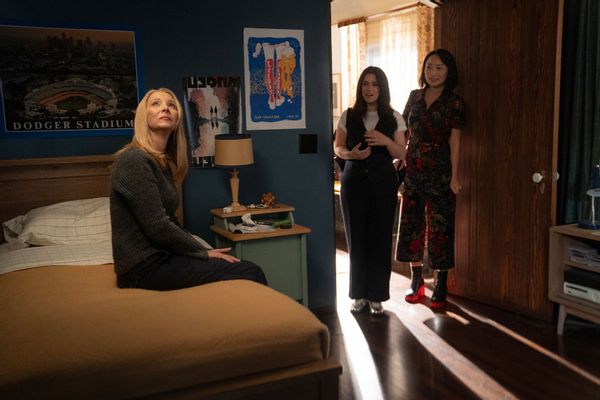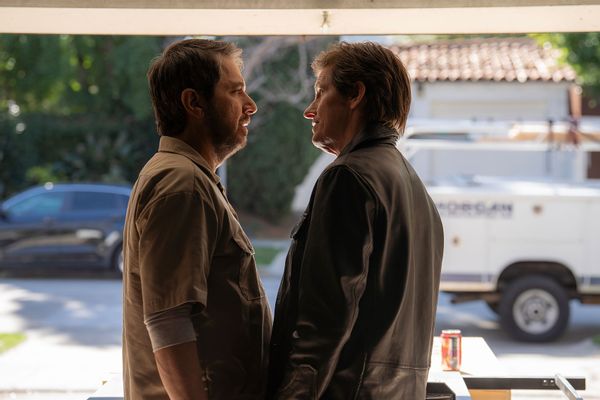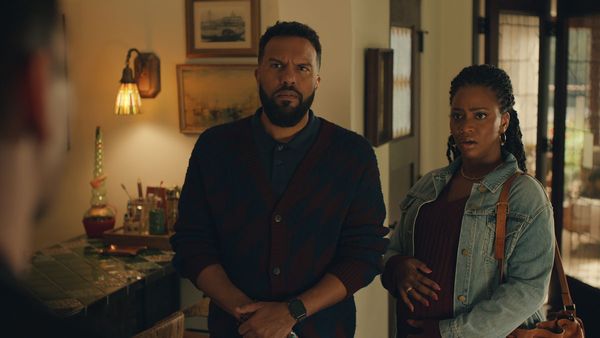
A central draw of “No Good Deed” is its curb appeal. There’s the fantasy house at the story’s heart, a 1920s Spanish-style villa proudly peacocking on a quiet street in Los Angeles’ Los Feliz neighborhood. There’s the pairing of reverenced sitcom stars Lisa Kudrow and Ray Romano as empty nesters Lydia and Paul Morgan.
It bears “Dead to Me” creator Liz Feldman’s emblem, hinting there’s more to this seemingly light-hearted story about four families hopelessly attaching their hearts to this place – three as buyers, and one that’s not quite ready to sell but needs to.
Feldman says in a Netflix promotional video that her search for a house inspired “No Good Deed,” but the jockeying between couples who want it for themselves either to create their own family memories or for the status feels relatable.
Thanks to the proliferation of true crime, so does the specter of death and grief invisibly haunting the place. The Morgans, you see, didn’t lose all of their children due to the inevitability of growing up. Lydia barely hangs on to her sanity with hands too shaky to play her priceless piano, a family heirloom. And Paul is hunched under the weight of it all.
Highlighting the Morgans’ pain as a mystery the neighbors treat as juicy gossip – or worse, an excuse to demand a discount – lends a cynical tang to all the amusement.
As with her previous Netflix series, “No Good Deed” balances expectation and surprise, starting with its star power. Joining Romano and Kudrow are Linda Cardellini and Luke Wilson as trophy wife Margo Starling and soap star JD Campbell, the strivers living across the street in a garish hyper-modern nightmare.
Once the listing goes up, Margo is the first of the curious neighbors to show up to the open house (and the most noticeable, given her head-to-toe swaddling in Gucci logos). Also on the tour are Sarah (Poppy Liu) and Leslie Fisher (Abbi Jacobson), the type of doctor-lawyer power couple real estate agents live to attract.

But they’re also up against a novelist, Dennis (O-T Fagbenle), and his very pregnant new wife Carla (Teyonah Parris), for whom the place exceeds their wildest vision of a dream home – and the limits of their bank account.
Of course, the house itself may end up being the most coveted celebrity in the show since nobody can stop talking about it. Feldman understands that an expensive home is part and parcel of TV fantasy, one of those details nobody questions until, say, the real building where your favorite fake family lives hits the market and you find out it’s worth way more than the average family of six could afford.
That was more of a shocker in, say, 2016, when the San Francisco Victorian whose exterior is featured in “Full House” sold for $4 million than in 2024 when the same house was offered again at $6 million.
Other details “No Good Deed” really gets right are how emotionally predatory house shopping can be, along with the way real estate is a layered wealth indicator. If you can afford to buy a house, there are the attendant matters of keeping and maintaining it.
Those may be doable, but what if you want a bigger place or to move to a better school district – are you well-off enough to afford those life upgrades? And if you have the means, how far would you go to get what you want?
People tend to keep these concerns to themselves, especially hiding them from the neighbors and family like Paul’s brother Mikey (Denis Leary), an ex-con fresh out of the clink who also drops by and demands hush money to keep from the details of something he helped him with.

That friction also brings out superb dramatic performances in its leads – especially Kudrow, who shakes off the ghost of “Friends” entirely in her rendition of Lydia, whose psychological trauma ended her career as a celebrated concert pianist.
Romano escaped the shadow of “Everybody Love Raymond” long before this, including anchoring “Men of a Certain Age.” But shades of Phoebe Buffay pop up in much of Kudrow’s work, even her dramatic roles, in ways that simply don’t show up here.
When Lydia and Paul implode in a later scene the viewer can truly appreciate how much Kudrow and Romano have been hinting at and holding back since the story’s opener.
Their performances are the soulful bass line anchoring a lilting farce spiced and spiked with personalities that harmonize and clash with the main duo. Leary is plausible as ever as the dirtbag brother screwed over in the family will; he’s the oldest son but his parents left the family home to Paul, who became a contractor while Mikey slipped into criminality.
Cardellini’s Margo may be the ensemble’s most commanding figure, as one would expect of a top Feldman alumnus. Shallow and conniving, Margo is evocative of the new money in this neighborhood that assumes the Morgans have the life and the house she wants. Cardellini enticingly plays up her shabby amorality to a point that no amount of designer-label lacquer can camouflage it.
Of the two other couples played by Liu and Jacobson and Fagbenle and Parrish, the latter’s Dennis and Carla benefit from more overt comedy offered by Anna Marie Horsford’s meddling mother-in-law Denise and her slurry of guilt-tripping, smothering and genuine concern.

A major humor vein that “No Good Deed” taps reminds us that everyone has dirty closets and hidden rooms, although as Feldman demonstrated in her last Netflix series only a couple register as significant or delectable. Most are the narrative equivalent of adhesive or plausible excuses to cross or join storylines and keep the action moving.
This isn’t an overwhelming mark against it; it’s mostly worth citing to say a cleverer work would be better at hiding its seams. Aesthetic distractions notwithstanding, “No Good Deed” succeeds as both an aspirational open house and a thoughtful gaze inside the emotional walls of a home, especially the memories, funny and forlorn, that hold everything in place.
"No Good Deed" is streaming on Netflix.







